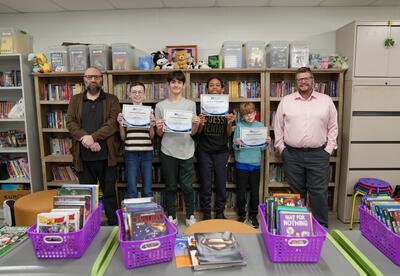Speech Therapy
We believe that every student can communicate. Communication is complex and multi-modal (verbal/non-verbal). Language skills are necessary within the school environment to engage in social interactions, to support functional performance, and to access the curriculum. Effective communication is the cornerstone of preparing students to become contributing members of society.
Administration Office
799 West Kensington Road
Mount Prospect, IL 60056-1111
Program Coordinator:
Maggie Cerniglia
847-463-8128 | mmcerniglia@nsseo.org
Professional Learning Administrative Assistant
Katie Krafton
847-463-8133 kkrafton@nsseo.org
NSSEO provides Speech and Language technical assistance to school-based programs within the cooperative and is available to all eight member districts. A best-practice model, as defined by the American Speech and Hearing Association (ASHA), is used to support the integral roles Speech-Language Pathologists have in education. Speech-Language services help students meet the performance standards of the school district and state (Common Core State Standards) specifically reading, writing, listening, speaking, and problem solving.
The Speech and Language services consist of an ASHA certified Speech-Language Technical Assistance Coordinator and an Administrative Assistant.
- Facilitate Speech and Language department meetings within NSSEO programs and member districts.
- Consultation with special education staff, administration, general education staff, parents.
- Assessment of oral motor skills and the development of feeding programs.
- Dissemination of best-practice information in the form of newsletters, email alerts, and state and federal publications.
- Specialized coaching for Early Childhood and English Language Learner programs.
- Support for the role of the Speech Language Pathologist in implementing Response to Intervention (RtI) and integrated therapy services.
NSSEO SLP Criteria
Introduction and Overview
Team Input Form Rating Scale Descriptions
Definitions, Eligibility & Universal Strategies
Guidance Document for Professional Judgement
Early Childhood Forms
Oral Language: Listening and Speaking
Social Language
Speech Sound Production
Team Input: Articulation / Phonology – EC/K
Scoring TI EC/K
Rating Scale
Articulation Profile
Kindergarten – Grade 2
Oral Language: Listening and Speaking
Social Language
Speech Sound Production
Team Input: Articulation – Grades K-12
Scoring TI K-12
Rating Scale
Articulation Profile
Grades 3 – 5
Oral Language: Listening and Speaking
Social Language
Speech Sound Production
Team Input: Articulation – Grades K-12
Scoring TI K-12
Rating Scale
Articulation Profile
Middle School and High School
Oral Language: Listening and Speaking
Social Language
Speech Sound Production
Team Input: Articulation – Grades K-12
Team Input (Bilingual)
Rating Scale
Articulation Profile
Complex Communication Needs
Alternative Language
Alternative Informal Assessment
Prevocational – Vocational Communication
Team Input
Fillable Prevocational-Vocational Prompt Hierarchy
Rating Scale
Miscellaneous
Fluency
Voice
English Language Learners (ELL)
Language(s) History Questionnaires
Speaking and Listening for Early Childhood
Speaking and Listening for Kindergarten-5th Grade (English)
Speaking and Listening for Kindergarten-5th Grade (en español)
Speaking and Listening for Kindergarten-5th Grade(w języku polskim)
Speaking and Listening for Middle-High School
Definition:
Response to Intervention (RTI) is a multi-tiered approach used to identify students at risk for poor learning outcomes and to provide specialized instruction and strategies to address learning needs within the general education setting. Within an RTI model, teams provide evidence-based interventions, monitor student progress, and adjust interventions depending on student responsiveness. RTI is a process of support for all students and is sanctioned in the re-authorization of the Individuals with Disabilities Education Improvement Act of 2004 (IDEA 2004).
SLPs play a critical role in assessment, instruction, intervention, progress monitoring, interpreting data and reporting on how communication skills relate to literacy and academic success (ASHA 2010).
MTSS/The Role of the SLP (Presentation, Spring 2016)
ASHA Handouts (Adapted from RTI in Action, ©2010, ASHA. Permission to share)
Tier 1:
- Collaborate
- Screen
- Interpret assessment results
- Model communication-facilitating strategies
- Suggest classroom modifications and accommodations
- Provide professional development programs
- Assist in identifying causal factors and prerequisite skills for struggling students
Help families understand the link between language and literacy
(ASHA 2010)
Resources:
Overview of Speech Language Impairment: Definitions, Eligibility & Strategies – PDF PowerPoint Presentation
The Role of the SLP in Schools (ASHA) – PDF
Speech-Language Pathologists – Who Are We, and What Do We Do?
Universal Strategies:
Comprehension – PDF
Expressive Language – PDF
Fluency – PDF
Social Language – PDF
Speech – PDF
Speech and Language Development (ASHA):
Tier 2:
- Collaborate
- Conduct more in-depth screenings
- Analyze curricular materials to determine appropriate modifications and adaptations
- Pre-teach or re-teach vital curricular concepts
- Provide short-term instruction in the classroom or in another setting
Participate in progress monitoring for specific groups or individuals
(ASHA 2010)
Tier 3:
- Collaborate
- Conduct more frequent and assessments and intense interventions with struggling students
Identify factors that may indicate a need for referral for a full multidisciplinary evaluation
(ASHA 2010)
Resources for Evidence Based Strategies:
Books
The NSSEO Feeding Protocol will be available upon request.
Contact Maggie Cerniglia, District Services Coordinator for access and technical assistance.
Contact: mmcerniglia@nsseo.org
www.ishail.org Illinois Speech Language Hearing Association
www.asha.org American Speech-Language-Hearing Association
www.myinfinitec.org Infinitec



